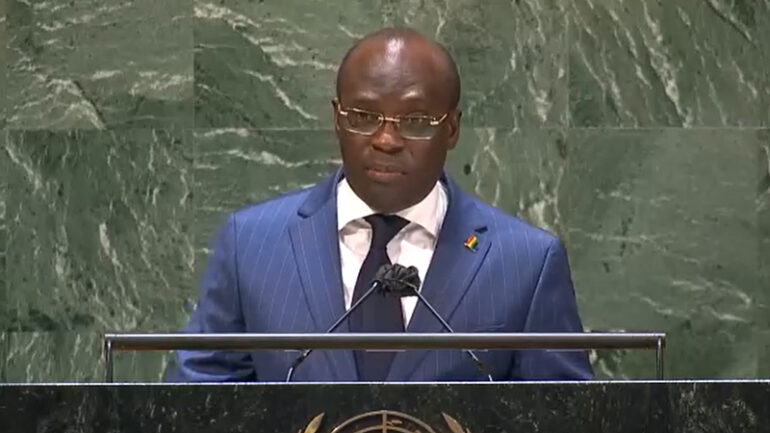Statement at the UN global plan of action to combat trafficking in persons

- Posted by admin
- Posted in Statement & Remarks, UN News
Ambassador Harold Agyeman
Permanent Representative
Ghana Permanent Mission to the United Nations
November 23, 2021, New York City
AS DELIVERED
DURING THE HIGH- LEVEL MEETING OF THE GENERAL ASSEMBLY ON THE APPRAISAL OF THE UNITED NATIONS GLOBAL PLAN OF ACTION TO COMBAT TRAFFICKING IN PERSONS Under Agenda Item 108 [Crime Prevention and Criminal Justice]
Mr. President,
Mr. Secretary-General,
Excellencies,
Distinguished Delegates,
At the outset, I would like to thank the President of the General Assembly for convening this important high-level event aimed at appraising progress in the implementation of the Global Plan of Action to Combating Trafficking in Persons.
Ghana expresses her solidarity with the victims and survivors of the dehumanising act of trafficking in persons, and reiterates the importance of the implementation of applicable human rights conventions such as the UN Convention against Transnational Organized Crime and the Protocol to Prevent, Suppress and Punish Trafficking in Persons.
Mr. President,
My delegation however continues to remain concerned about the continuous rise in the menace especially among women, children and the youth and, in the context of West Africa, by the growing link between armed groups, including terrorist groups, and trafficking in persons. The use of online platforms to facilitate various aspects of trafficking in persons, including advertising, grooming, recruitment, and various forms of exploitation, such as online child sexual exploitation, are also of great concern.
Mr President,
Contributory factors to the menace of trafficking in persons, notably the dire socio-economic conditions in several developing countries, including the situation of unemployment, endemic poverty, gender inequalities, and corruption, have been exacerbated by the harsh incidence of the COVID-19 pandemic.
Ghana therefore welcomes the timely adoption of this forward-looking Political Declaration, which, we believe, will help to re-ignite global solidarity in combating the menace as a matter of urgency.
At the national level, the Government of Ghana has demonstrated commitment in tackling the issue of trafficking in persons through the enactment of legislations to prevent and suppress trafficking, punish persons complicit in human trafficking and the initiation of interventions to promote the protection and welfare of victims. A key legislation is the Human Trafficking Act, 2005 (Act 694) and a notable policy measure has been the establishment of Anti-Human Trafficking Units within its law enforcement agencies including the Ghana Police Service and the Ghana Immigration Service.
Mr. President,
Before concluding my remarks, I wish to highlight the following points:
First, technical assistance for developing countries continues to be critical in developing capacity. In this regard, I wish to express appreciation to stakeholders like the UNODC, IOM and ILO for their role in this area and urge increased support in that regard.
Secondly, while welcoming investment in areas like border management, intelligence-sharing to help in early detection, or the disruption of the perpetrators of this heinous crime, it is our view that these are only rudimentary in the fight against menace. Additional support would be required in tackling the causes of the canker
Thirdly, there is the need to channel more investment into addressing the root causes of the canker, particularly governance and development deficits, with the prioritisation of women and the youth as well as victims and survivors of the menace in the decision-making processes.
Fourthly, the outbreak of the COVID-19 pandemic has led to a decline in fiscal revenues across many developing countries. We therefore urge renewed responses to address the peculiar financial challenges, including through debt cancellation and the restructuring of debt repayment to enable them respond to their socio-economic challenges and build back better in a manner that helps prospective victims to be less inclined to fall prey to the traps of traffickers.
Fifthly, we encourage more funding support for the United Nations Voluntary Trust Fund for Victims of Trafficking in Persons as well as stronger support for regional and sub-regional arrangements like the African Union (AU) Action plan and the ECOWAS Action Plan to combat human trafficking.
Ghana’s believes that the Political Declaration and the UN Plan of Action to Combat Trafficking in Persons provide a solid foundation for dealing with the issue. Political will by Member States in ratifying and translating these bold commitments into national policies as well as implementing them is the key to sustaining efforts in dealing with the menace.
I thank you for your kind attention.
